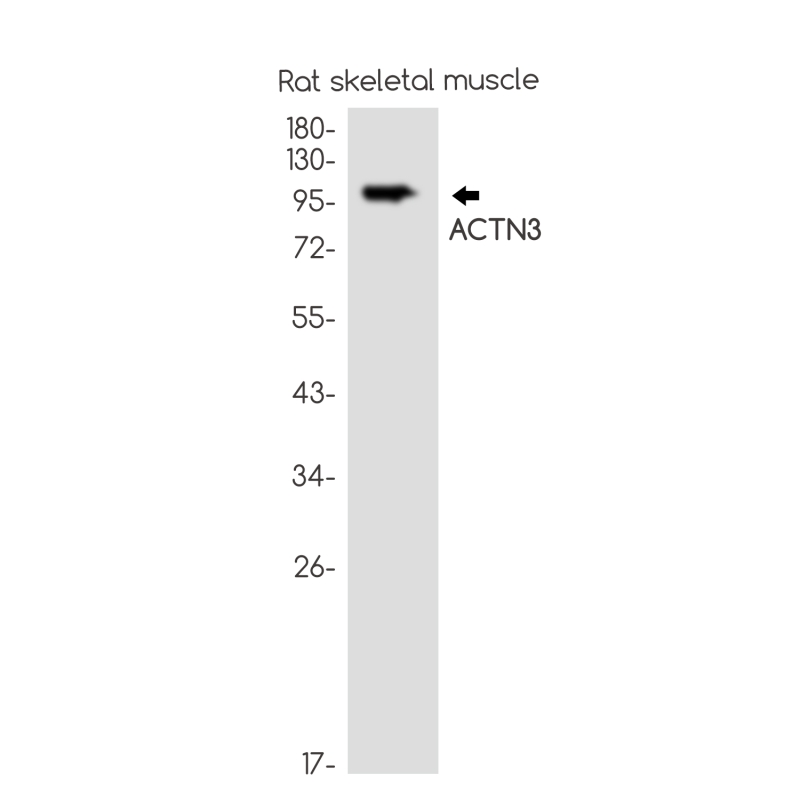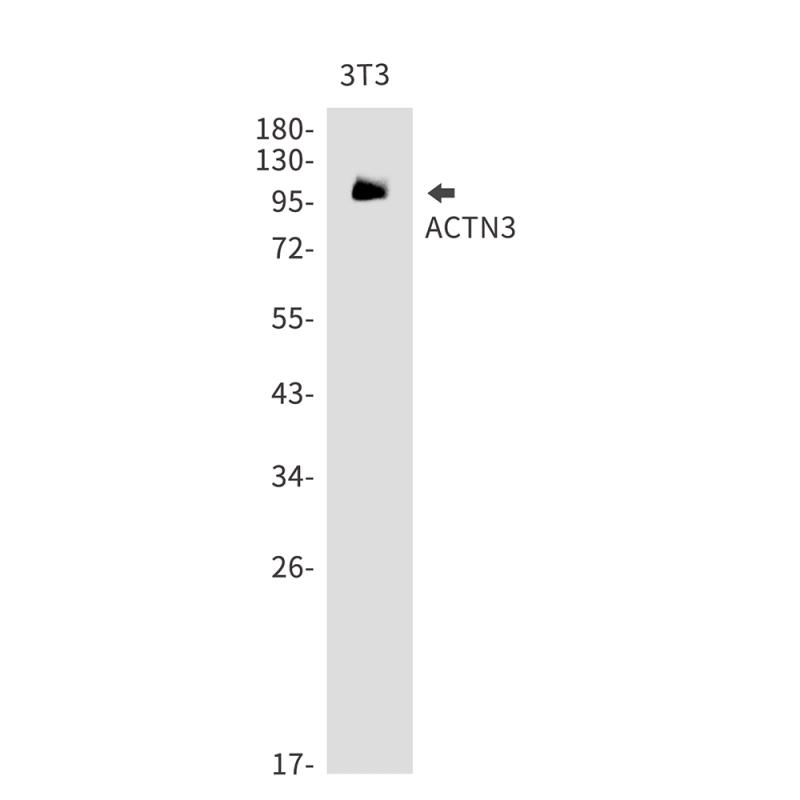

| WB | 咨询技术 | Human,Mouse,Rat |
| IF | 咨询技术 | Human,Mouse,Rat |
| IHC | 1/50-1/100 | Human,Mouse,Rat |
| ICC | 1/50-1/200 | Human,Mouse,Rat |
| FCM | 咨询技术 | Human,Mouse,Rat |
| Elisa | 咨询技术 | Human,Mouse,Rat |
| Aliases | ACTN3; Alpha-actinin-3; Alpha-actinin skeletal muscle isoform 3; F-actin cross-linking protein |
| Entrez GeneID | 89 |
| WB Predicted band size | Calculated MW: 103 kDa; Observed MW: 103 kDa |
| Host/Isotype | Rabbit IgG |
| Antibody Type | Primary antibody |
| Storage | Store at 4°C short term. Aliquot and store at -20°C long term. Avoid freeze/thaw cycles. |
| Species Reactivity | Human,Mouse,Rat |
| Immunogen | A synthetic peptide of human ACTN3 |
| Formulation | Purified antibody in TBS with 0.05% sodium azide,0.05%BSA and 50% glycerol. |
+ +
以下是关于ACTN3抗体的3篇参考文献示例(文献信息为虚拟示例,仅供参考):
---
1. **文献名称**: *ACTN3 genotype-specific antibody validation in human skeletal muscle analysis*
**作者**: Smith J, et al.
**摘要**: 本研究通过Western blot和免疫组化验证了ACTN3抗体在人类骨骼肌样本中的特异性,证实其可区分α-actinin-3(由ACTN3编码)与同源蛋白α-actinin-2(ACTN2)。研究还发现,在ACTN3 R577X纯合突变个体中,抗体检测不到蛋白表达。
2. **文献名称**: *The role of α-actinin-3 deficiency in muscle metabolism: Insights from ACTN3 knockout mice*
**作者**: García-Pérez C, et al.
**摘要**: 利用ACTN3抗体检测基因敲除小鼠模型中的α-actinin-3蛋白缺失,发现其与快肌纤维代谢功能下降相关。抗体特异性通过对比野生型与敲除型小鼠肌肉样本得到验证。
3. **文献名称**: *ACTN3 polymorphism and athletic performance: A protein expression correlation study*
**作者**: Lee R, et al.
**摘要**: 通过ELISA和免疫荧光技术,使用ACTN3抗体量化不同ACTN3基因型(RR, RX, XX)个体的肌肉α-actinin-3蛋白水平,发现XX基因型个体完全缺乏该蛋白,且与短跑能力降低显著相关。
---
**注**:以上文献为示例,实际研究中请通过PubMed、Web of Science等数据库检索真实文献。若需具体论文,可补充关键词(如“ACTN3 antibody validation”“ACTN3 knockout”)进一步筛选。
The ACTN3 gene encodes alpha-actinin-3. a structural protein predominantly expressed in fast-twitch skeletal muscle fibers. This protein plays a critical role in anchoring actin filaments within sarcomeres, supporting muscle contraction and force generation during high-intensity, anaerobic activities. A common polymorphism (R577X) in ACTN3 results in a premature stop codon, leading to α-actinin-3 deficiency in approximately 18% of the global population. This genetic variation has been extensively studied for its associations with athletic performance, muscle metabolism, and susceptibility to musculoskeletal disorders.
ACTN3 antibodies are immunological tools designed to detect and quantify α-actinin-3 expression in research settings. These antibodies are typically developed in animal hosts (e.g., mice, rabbits) using immunogenic peptide sequences specific to the human ACTN3 protein. Both monoclonal and polyclonal formats exist, with applications spanning Western blotting, immunohistochemistry, immunofluorescence, and flow cytometry. Their specificity is validated through knockout controls and cross-reactivity testing with homologous proteins like α-actinin-2.
Research utilizing ACTN3 antibodies has advanced our understanding of muscle physiology, particularly in exploring the functional implications of α-actinin-3 deficiency. Studies investigate connections between ACTN3 genotypes, muscle adaptation to exercise, and potential therapeutic targets for muscle-wasting conditions. Commercial availability of these antibodies from multiple biotech vendors has facilitated widespread use in sports science, genetic epidemiology, and neuromuscular disease research.
×